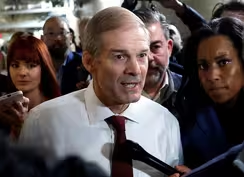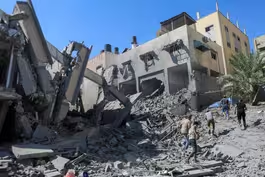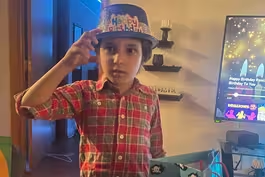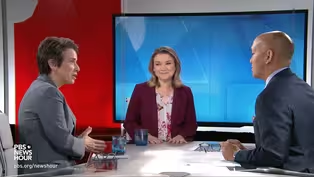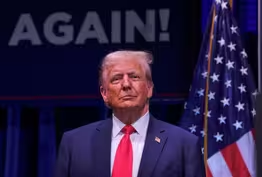
Middle East diplomacy intensifies as war threatens to expand
Clip: 10/16/2023 | 8m 43sVideo has Closed Captions
Diplomatic efforts intensify in Middle East as Israel-Hamas war threatens to expand
The Hamas terrorist attack on Israel shook the Middle East and threatens to expand far beyond Gaza. Secretary of State Blinken has visited seven countries across the region hoping to prevent the war from expanding, gain release for American hostages and coordinate humanitarian aid. Nick Schifrin discussed the regional consequences with Francis Ricciardone and Hanin Ghaddar.
Problems playing video? | Closed Captioning Feedback
Problems playing video? | Closed Captioning Feedback
Major corporate funding for the PBS News Hour is provided by BDO, BNSF, Consumer Cellular, American Cruise Lines, and Raymond James. Funding for the PBS NewsHour Weekend is provided by...

Middle East diplomacy intensifies as war threatens to expand
Clip: 10/16/2023 | 8m 43sVideo has Closed Captions
The Hamas terrorist attack on Israel shook the Middle East and threatens to expand far beyond Gaza. Secretary of State Blinken has visited seven countries across the region hoping to prevent the war from expanding, gain release for American hostages and coordinate humanitarian aid. Nick Schifrin discussed the regional consequences with Francis Ricciardone and Hanin Ghaddar.
Problems playing video? | Closed Captioning Feedback
How to Watch PBS News Hour
PBS News Hour is available to stream on pbs.org and the free PBS App, available on iPhone, Apple TV, Android TV, Android smartphones, Amazon Fire TV, Amazon Fire Tablet, Roku, Samsung Smart TV, and Vizio.
Providing Support for PBS.org
Learn Moreabout PBS online sponsorshipGEOFF BENNETT: The Hamas terrorist attack into Israel shook the Middle East and threatens to expand far beyond Gaza.
Nick Schifrin examines the regional consequences, as well as efforts to confront a humanitarian and hostage crisis in Gaza.
NICK SCHIFRIN: Over the last five days, the U.S. secretary of state, Antony Blinken, has visited seven countries across the Middle East, one of his most intense regional diplomatic efforts.
The goals are to prevent the war from expanding, gain release for Hamas as American hostages, and coordinate across the region on humanitarian aid.
To discuss all that, we get two perspectives.
Francis Ricciardone was a career American diplomat with extensive experience in the Middle East and was U.S. ambassador to Egypt during the George W. Bush administration.
And Hanin Ghaddar was a journalist in Lebanon and has written extensively about Hezbollah.
She's now a senior fellow at the Washington Institute for Near East Policy.
Thank you very much.
Welcome to both of you to the "NewsHour."
Ambassador Ricciardone, if I could start with you, officials telling me that it is largely Egypt that is blocking the opening of the Rafah Crossing through which Gazans would presumably leave Gaza and humanitarian assistance would presumably enter.
As far as you can tell, why would Egypt be resisting opening Rafah?
FRANCIS RICCIARDONE, Former U.S.
Ambassador to Egypt: The Egyptians have a long and complicated history with Gaza, the Palestinian Authority, and Israel and the United States over this through -- and this is not a sudden problem, or something new with this latest flare-up in what at least a 16-year-old war.
You can argue when the war actually began.
The Egyptians have serious national security interests in at least containing Gaza.
But the Egyptians had wanted much more than that over the years.
It's not enough, in their view, simply to contain the people of Gaza and the Gaza problem.
In the long run, a two-state solution is what the Egyptians have always favored.
When I was ambassador, the Israelis pulled out their settlements.
The IDF pulled out their occupation and worked to seal it off.
It became U.S. policy, working with Egypt to help seal that border.
It was U.S. policy to promote elections in Gaza, against Egyptian warnings and Israeli warnings, which resulted in Hamas coming to power, in a great irony.
The Egyptians do not like Hamas.
They see it as a wing of the Muslim Brotherhood and, therefore, a national security terrorist threat to them.
They -- in the short run, they don't want Hamas bleeding into Egypt.
In the longer strategic run, they do not want Egypt to be the solution to the lack of a Palestinian state for the Gazans.
They do not want a transplantation of the population of Gaza to Egypt.
NICK SCHIFRIN: And why should those security, why should those strategic imperatives block Egypt being more helpful when it comes to humanitarian aid?
FRANCIS RICCIARDONE: Probably for much of the same reason that the Israelis are not about to open the land border or the sea border or the airspace.
The Egyptians, as I understand from the latest announcements, are, in fact, prepared to have some sort of very controlled, very carefully managed opening to let some people out.
It sounds like that is happening.
And I expect it would be very limited and carefully controlled.
NICK SCHIFRIN: Hanin Ghaddar, take us to Israel's northern border with Lebanon at this point.
What do you think the likelihood is of Lebanese Hezbollah opening up a second front?
HANIN GHADDAR, Washington Institute for Near East Policy: Hezbollah has been very careful.
They are very calculated so far.
They are still playing within the rules that were set after the 2006 July war with Israel.
They haven't really attacked Israel beyond the northern border, military posts, radars, telecommunications, nothing beyond that.
They don't want to risk losing all the benefits that they have reaped from this war.
They have -- so far the gains are much higher than the losses, and they do not want to change this equation.
If they go into the war, their calculations today is, these gains are still very vulnerable.
And they haven't been translated in political and diplomatic gain internationally.
So they don't want to risk them, until they have to, until this turns into a regional, existential war for them.
Hassan Nasrallah, Hezbollah's leader, hasn't said a word yet.
This is very telling.
It means that they are still watching, observing, deliberating the next steps, but they haven't made a decision to go full-scale war.
Iran has - - Hezbollah's strongest card is in Lebanon, is Hezbollah.
And they don't they don't want to lose it, because Hezbollah has precision missiles.
Hezbollah has other missiles today that are pointed at Israel, are much stronger as a threat.
And if they use them, they will lose them.
And they know that.
And this -- they will be exposed to a big war without any guaranteed victory that they can claim.
NICK SCHIFRIN: The U.S. has moved its largest aircraft carrier off the coast of Israel.
A second aircraft carrier is currently sailing toward the Mediterranean.
Does that deter Lebanese Hezbollah?
HANIN GHADDAR: Yes, absolutely, because I don't think their calculations included such a strong response by the U.S. By all their statements, they understand the risks of a war that would involve the U.S.
They totally understand.
That was not something that they were expecting.
And this is not something that they would ignore.
NICK SCHIFRIN: Let's zoom out now.
Ambassador Ricciardone, first to you.
U.S. officials tell me one of the main goals, of course, of Secretary Blinken's travel is to get hostages out, especially American hostages.
The IDF said today that there are over 199 hostages being held by Hamas in Gaza.
This involves Qatar, Egypt, Hamas, and Israel, a real regional push.
Even if you don't know the details, how would those conversations be going right now that the secretary of state is leading?
FRANCIS RICCIARDONE: In the very first place, there have to be channels for those conversations.
I have to hold that there -- such channels exist.
Those probably are through the Egyptian intelligence and security channels that did exist.
Perhaps the Qataris have them.
The Turks at one time had them.
And I have to presume that that's why the secretary is in the region right now, trying to activate those channels to get word through to them somehow.
But then the question becomes, what to say, what to induce them, beyond the public statements of cease and desist.
NICK SCHIFRIN: And, Hanin Ghaddar, U.S. policy toward the region for years was focused, in the words of one senior U.S. official, at keeping the region off the president's desk.
More recently, the U.S. has been focused on normalizing relations between Israel and Saudi Arabia.
Do you believe that normalization effort right now is, at the very least, frozen?
HANIN GHADDAR: At the very least, frozen, yes, absolutely.
It's very apparent that this is one of the main goals, or the main benefits that the Iranians have reaped from this war with the Hamas attack, whether it was intentional or not.
This is definitely something that the Iranian regime is exploiting today.
They realize that it's not just the normalization with Saudi Arabia between Israel and Saudi Arabia.
It's what it really represents for them, because it's really finalized or takes the region in a different way, in terms of the new Middle East, led by these efforts by the West, more economic focus, more linking the Israel via the Gulf to India.
This is more of an economic link that is mainly isolating Iran and its proxies.
And Iran got the message how isolated they are today from the new Middle East, or the Middle East that is going in a very different direction, especially economically.
The Saudis today are in a position where they can't really ignore what's happening today and continue with the normalization efforts.
They -- something is needed, something's got to give before they go back.
So I would say, for -- definitely, it's at least frozen, and everybody in the region sees it that way.
NICK SCHIFRIN: Hanin Ghaddar, Francis Ricciardone, thank you very much to you both.
HANIN GHADDAR: Thank you very much.
House enters 3rd week without speaker amid GOP infighting
Video has Closed Captions
Clip: 10/16/2023 | 3m 1s | House enters 3rd week without speaker as GOP infighting keeps Congress at standstill (3m 1s)
Humanitarian crisis in Gaza worsens before expected invasion
Video has Closed Captions
Clip: 10/16/2023 | 9m 59s | Humanitarian crisis in Gaza worsens ahead of anticipated Israeli invasion against Hamas (9m 59s)
Modern translation of 'The Iliad' reinforces its relevance
Video has Closed Captions
Clip: 10/16/2023 | 7m 14s | How a translation of 'The Iliad' into modern language reinforces its relevance (7m 14s)
Murder of Muslim boy in Illinois shakes communities
Video has Closed Captions
Clip: 10/16/2023 | 5m 32s | Murder of Palestinian American boy in Illinois shakes Arab and Muslim communities (5m 32s)
Tamara Keith and Amy Walter on a possible Jordan speakership
Video has Closed Captions
Clip: 10/16/2023 | 9m 6s | Tamara Keith and Amy Walter on Jim Jordan's chances of becoming House speaker (9m 6s)
What a gag order on Trump means for his election case
Video has Closed Captions
Clip: 10/16/2023 | 4m 16s | What a partial gag order on Trump means for his election subversion case (4m 16s)
Providing Support for PBS.org
Learn Moreabout PBS online sponsorship
- News and Public Affairs

FRONTLINE is investigative journalism that questions, explains and changes our world.

- News and Public Affairs

Amanpour and Company features conversations with leaders and decision makers.












Support for PBS provided by:
Major corporate funding for the PBS News Hour is provided by BDO, BNSF, Consumer Cellular, American Cruise Lines, and Raymond James. Funding for the PBS NewsHour Weekend is provided by...
